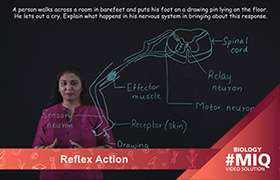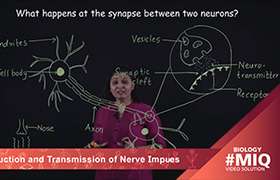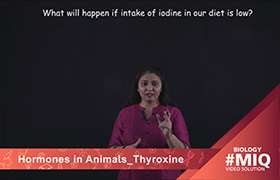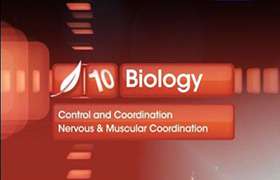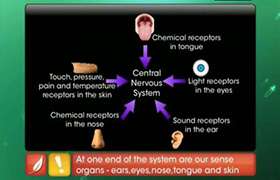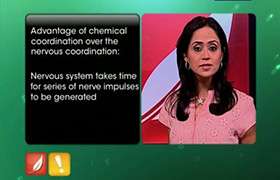CBSE Class 10 Answered
what are the various abnormal conditions caused by over secretion and under secretion of hormone?
Asked by sujata verma | 14 Jun, 2013, 07:33: PM
A hormone is a chemical released by a cell, a gland, or an organ in one part of the body that affects cells in other parts of the organism.
Hyperthyroidism:-
- Graves's disease, considered an autoimmune disease, shows elevated metabolic rate, excessive perspiration, rapid, irregular heartbeat, nervousness and weight loss
- exophthalmos: protrusion of the eyeballs caused by edematous tissue behind the eyes
Hypothyroidism:-
- cretinism (infantile hypothyroidism) - shows stunted growth, thickened facial features, abnormal bone development and mental retardation,
- myxedema - low metabolic rate, lethargy, weight gain, increase in body fluids
- goiter - abnormal growth of the thyroid gland
-
Hyperinsulinism:-
- hypoglycemia - resulting in lack of glucose delivery to the brain causing disorientation, unconsciousness and even death (usually the result of an overdose of insulin)
Hypoinsulinism:-
- Type I Diabetes (insulin - dependent diabetes mellitus)- elevated glucose levels in the blood and urine. Over time diabetics experience vascular and neural problems. Secondarily, poor circulation may lead to gangrene, blindness, kidney damage and impotence.
- Type II Diabetes - while occurring later in life, the conditions and problems that accompany Type I diabetes occur here as well. There are many hormones which have different functions like this.
Answered by | 15 Jun, 2013, 11:27: AM
Application Videos
Concept Videos
CBSE 10 - Biology
Asked by rashmij34 | 04 Mar, 2024, 12:04: PM
CBSE 10 - Biology
Asked by yayiaow1 | 03 Dec, 2023, 08:10: PM
CBSE 10 - Biology
Asked by patelsakshi07patel | 22 Nov, 2023, 07:24: PM
CBSE 10 - Biology
Asked by ashuashutoshsharma2 | 11 Nov, 2023, 11:38: PM
CBSE 10 - Biology
Asked by ishapanday76 | 20 Oct, 2023, 01:09: PM
CBSE 10 - Biology
Asked by adarshyadava123 | 19 Aug, 2022, 10:27: AM
CBSE 10 - Biology
Asked by bhu.joshi54 | 14 Jun, 2022, 09:27: PM
CBSE 10 - Biology
Asked by bhu.joshi54 | 14 Jun, 2022, 09:24: PM
CBSE 10 - Biology
Asked by hhemantasingh87 | 05 May, 2022, 03:00: PM
CBSE 10 - Biology
Asked by swatipuspapatel | 05 Aug, 2021, 01:38: PM


